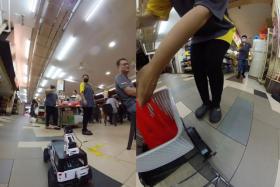Singaporeans rank their most embarrassing social media posts
Singaporeans are embarrassed by their social media posts relating to actions such as drunken behaviour, kissing someone and sleeping somewhere they should not have been, and being photographed in their underwear, a new study has found.
Cyber security firm McAfee yesterday released the results of the study, which narrowed down the top 10 kinds of posts Singaporeans found most embarrassing.
The survey of 500 Singaporeans found that drunken behaviour, making offensive comments and wearing an embarrassing outfit were the top three kinds of posts that Singaporeans regretted putting up on their social media accounts.
This was followed by posts relating to embarrassing places or events, accidental exposure of their private parts, kissing someone they should not have been and being photographed in their underwear.
Posts about them swearing, exposing themselves on purpose and sleeping somewhere they should not have been are also on the list.
The survey was done online over a month from the end of July.
According to McAfee, nearly four in five of the Singaporeans surveyed own up to being embarrassed by their social media, and nearly one-fifth admitted that they could not remember the last time they checked their timelines.
More than seven in 10 of these respondents said they had an inactive social media account.
LAX ATTITUDE
McAfee said their lax attitude towards their social media accounts and privacy settings would mean that such posts could potentially harm a person's career and job prospects.
"Well-publicised examples of celebrities and personalities' posts coming back to haunt them are all over the news, yet many fail to take even basic steps to ensure prospective employees aren't able to see content that could impact their professional image," said McAfee.
Its head of South-east Asia consumer business, Mr Shashwat Khandelwal, said such dormant and carelessly shared posts and information could have potentially damaging ramifications.
He said: "Many Singaporeans have abandoned social media accounts that are not deleted, leaving behind personal information and old photos that could be seen by potential peers and employers, or worse, cyber criminals looking to harvest data for personal gain."
He encouraged netizens to set privacy and security settings, never reuse passwords, think before posting, and do a "digital past clean-up", which involves deleting unused social media accounts, unwanted tags in comments and posts.
Get The New Paper on your phone with the free TNP app. Download from the Apple App Store or Google Play Store now



